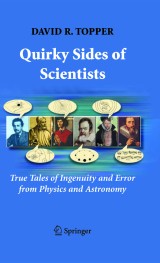Details

Quirky Sides of Scientists
True Tales of Ingenuity and Error from Physics and Astronomy|
37,44 € |
|
| Verlag: | Springer |
| Format: | |
| Veröffentl.: | 03.08.2007 |
| ISBN/EAN: | 9780387710198 |
| Sprache: | englisch |
| Anzahl Seiten: | 210 |
Dieses eBook enthält ein Wasserzeichen.
Beschreibungen
<P>These historical narratives of scientific behavior reveal the often irrational way scientists arrive at and assess their theories. There are stories of Einstein’s stubbornness leading him to reject a correct interpretation of an experiment and miss an important deduction from his own theory, and Newton missing the important deduction from one of his most celebrated discoveries. This enlightening book clearly demonstrates that the greatest minds throughout history arrived at their famous scientific theories in very unorganized ways and they often did not fully grasp the significance and implications of their own work.</P>
Tenacity and Stubbornness: Einstein on Theory and Experiment.- Convergence or Coincidence: Ancient Measurements of the Sun and Moon—How Far?.- The Rationality of Simplicity: Copernicus on Planetary Motion.- The Silence of Scientists: Venus’s Brightness, Earth’s Precession, and the Nebula in Orion.- Progress Through Error: Stars and Quasars—How Big, How Far?.- The Data Fit the Model but the Model is Wrong: Kepler and the Structure of the Cosmos.- Art Illustrates Science: Galileo, a Blemished Moon, and a Parabola of Blood.- Ensnared in Circles: Galileo and the Law of Projectile Motion.- Aesthetics and Holism: Newton on Light, Color, and Music.- Missing One’s Own Discovery Newton and the First Idea of an Artificial Satellite.- A Change of Mind: Newton and the Comet(s?) of 1680 and 1681.- A Well-Nigh Discovery: Einstein and the Expanding Universe.
<P>http://history.uwinnipeg.ca/topper.html</P>
<P>David R. Topper is Professor of History at the University of Winnipeg where, since 1970, he has taught courses in the history of science and the history of art. He was the recipient of two teaching awards: the Robson Memorial Award for Excellence in Teaching at the University of Winnipeg (1981), and the National 3M Teaching Fellowship (1987). Since 1982 he has been an international co-editor and, from 2005, honorary editor of the journal Leonardo. His recent publications are on matters related to the work of Galileo, Newton, and Einstein.</P>
<P>David R. Topper is Professor of History at the University of Winnipeg where, since 1970, he has taught courses in the history of science and the history of art. He was the recipient of two teaching awards: the Robson Memorial Award for Excellence in Teaching at the University of Winnipeg (1981), and the National 3M Teaching Fellowship (1987). Since 1982 he has been an international co-editor and, from 2005, honorary editor of the journal Leonardo. His recent publications are on matters related to the work of Galileo, Newton, and Einstein.</P>
<P>These historical narratives of scientific behavior reveal the often irrational way scientists arrive at and assess their theories. There are stories of Einstein’s stubbornness leading him to reject a correct interpretation of an experiment and miss an important deduction from his own theory, and Newton missing the important deduction from one of his most celebrated discoveries. Copernicus and Galileo are found surpressing information. A theme running throughout the book is the notion that what is obvious today was not so in the past. Scientists seen in their historical context shatter myths and show them to be less modern than we often like to think of them.</P>
<p>Clearly demonstrates that the greatest minds throughout history arrived at their famous scientific theories in very unorganized ways. They often did not fully grasp the significance and implications of their own work</p><p>Outside a circle of specialized academics, these little-known yet fascinating stories are told in a clear and engaging style to captivate the scientific-educated reader</p><p>Enlightening the reader to the quirkiness of the scientific mind reveals that the popular image of the scientist is really a caricature of the way scientists think and do their work</p>
<P>These historical narratives of scientific behavior reveal the often irrational way scientists arrive at and assess their theories. The book clearly demonstrates that the greatest minds throughout history arrived at their famous scientific theories in very unorganized ways and they often did not fully grasp the significance and implications of their own work. There are stories of Einstein’s stubbornness leading him to reject a correct interpretation of an experiment and miss an important deduction from his own theory, and Newton missing the important deduction from one of his most celebrated discoveries. Outside a circle of specialized academics, these little-known yet fascinating stories are told in a clear and engaging style to captivate the scientific-educated reader. A theme running throughout the book is the notion that what is obvious today was not so in the past. Scientists seen in their historical context shatter myths and show them to be less modern than we often like to think of them.</P>

















